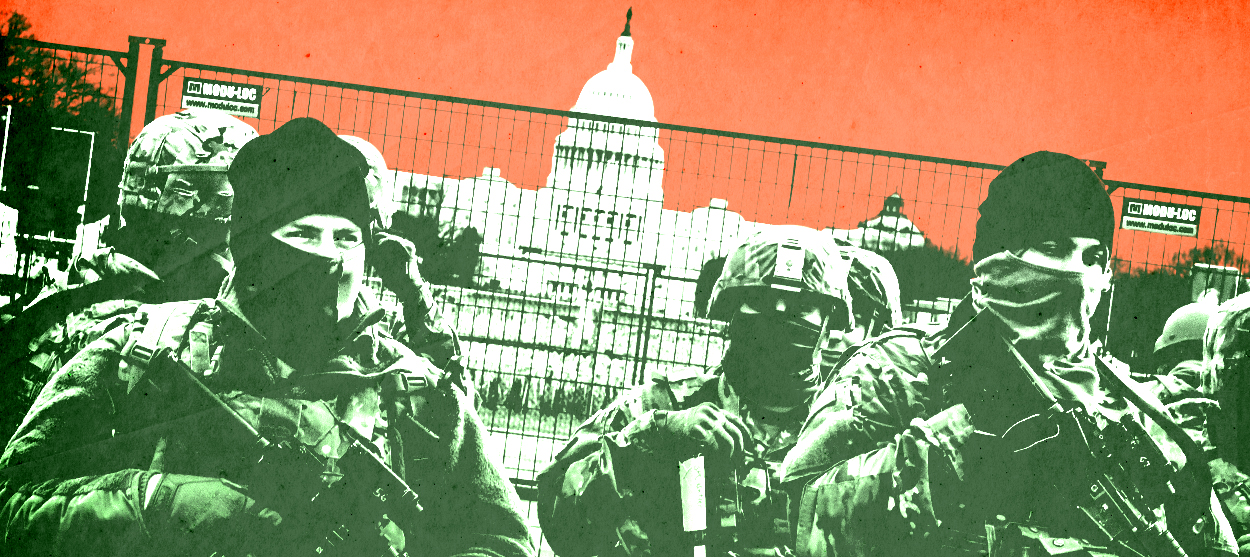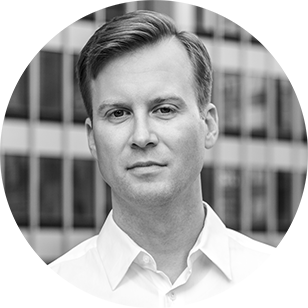The inauguration's sad symbolism
America's tradition of inaugural celebrations — and peaceful protests — is another casualty of the Trump era


A free daily email with the biggest news stories of the day – and the best features from TheWeek.com
You are now subscribed
Your newsletter sign-up was successful
Like almost every other aspect of the past year, Wednesday's inauguration of Joe Biden and Kamala Harris won't look like any we've seen before. Aside from the alterations that have been made due to the coronavirus pandemic, the special measures being taken because of the January 6 attacks on the U.S. Capitol and the ongoing threat of violence from Trump loyalists mean that this day will be a terrifyingly unique moment in history.
The security measures are extensive. As many as 25,000 troops have been deployed to Washington, D.C. The National Mall, normally filled with as many as one million spectators, has been declared off limits, and barricades circle the Capitol where the inauguration ceremony will take place. Across the city, various zones have been marked off to restrict traffic and general movement. As The New York Times recently reported, "the security perimeter…is necessary to prevent an attack from domestic extremists. Such groups 'pose the most likely threat' to the inauguration, according to a joint threat assessment from the FBI and Department of Homeland Security."
None of those threats should be confused with the legitimate and lawful protests that often accompany a presidential transition. Indeed, peaceful protests have been a regular feature of presidential inaugurations — and of American history itself. But the violence that has marked this presidential transition, and that possibly overshadows Wednesday's events, demonstrates the particular danger Trumpism still poses to the country and how much it has assaulted the basic foundations of American democracy.
The Week
Escape your echo chamber. Get the facts behind the news, plus analysis from multiple perspectives.

Sign up for The Week's Free Newsletters
From our morning news briefing to a weekly Good News Newsletter, get the best of The Week delivered directly to your inbox.
From our morning news briefing to a weekly Good News Newsletter, get the best of The Week delivered directly to your inbox.
Especially in the 20th century, when inaugurations became enormous public spectacles, Americans have regularly protested the events. Sometimes they protested the person taking office. Other times, they used the moment to direct attention to a cherished cause.
That was the case at the first major protest to mark an inauguration. In 1913, over five thousand women marched down Pennsylvania Avenue on the day before Woodrow Wilson's swearing in as president in what became known as the Women's Suffrage Parade. Wanting to bring focus to their call for a constitutional amendment giving women the right to vote, the marchers instead drew the ire of thousands of spectators, many of whom unleashed violent attacks on the women as police stood by. But the parade gave a boost to the growing suffrage movement. Seven years later, the Nineteenth Amendment fulfilled their goal.
In the second half of the century, protests at presidential inaugurations accelerated. Anti-Vietnam War protestors gathered in Washington for Richard Nixon's first and second inaugurations in 1969 and 1973. At the latter, as many as 60,000 anti-war activists shouted, "Nixon, Agnew, you can't hide; we charge you with genocide." Opponents of another war, this time in Iraq, descended on George W. Bush's second inauguration in 2005. By then, Bush was used to it. Four years earlier, 20,000 of what The New York Times described as "loud but mostly peaceful protestors" had shown up to demonstrate against what they believed had been a stolen election.
Much smaller protests visited Barack Obama's two inaugurations. His successor, however, would witness the largest protest ever assembled for a presidential inauguration when nearly half a million people in D.C. — and at least four million more in cities across the United States — joined in the Women's March the day after Donald Trump was sworn in.
A free daily email with the biggest news stories of the day – and the best features from TheWeek.com
Predictably, Trump took to Twitter to offer a rather unpredictable response to the protests against him. "Peaceful protests are a hallmark of our democracy. Even if I don't always agree, I recognize the rights of people to express their views."
That rare endorsement of democratic traditions and Constitutional guarantees was quickly overshadowed by Trump's long record of illiberal actions and anti-democratic impulses as president, especially his love of violence carried out on his behalf. At his numerous rallies, Trump regularly greeted protestors with threats of violence by his ravenous crowds. His continual encouragement of white nationalists and hate groups yielded devastating and deadly results.
All of that culminated with the events of January 6. Rather than accepting the results of a free and fair election, Trump, and his willing surrogates, stoked anger and outrage among supporters with their lies of rampant voter fraud and a stolen election. Instead of conceding his loss and initiating the process for a peaceful transfer of power — a bedrock condition of any functioning democracy — Trump spewed heated rhetoric while Congressional Republicans planned their outrageous challenge of the Electoral College results.
Riled up and enraged by all of it, Trump's core supporters showed up to carry out violence in his name, certain theirs was a righteous cause. In his inciting speech to the crowd shortly before the attack, Trump raged, "We will not let them silence your voices," while the crowd roared back, "Fight for Trump! Fight for Trump!"
They didn't need any last minute encouragement to violence, of course. Trump spent four years cultivating insurrectionary sentiments among his followers. But the rot goes much deeper than the several thousand who showed up to storm the Capitol. Nearly half of Republicans surveyed have said they support the attack. In just one presidential term, Trump has shifted the most extreme and out-of-bounds positions to the center of his party — and right into the mainstream of American politics.
That's why although Trump will no longer be president after Wednesday, Trumpism still dangerously lingers, perhaps even more inflamed.
Faced with a rampant pandemic and a cratering economy, Joe Biden must tackle some of the biggest challenges this nation has seen. But none may be bigger than attending to the lasting damage Trump has done to American democracy, now all-too-visible in a presidential inauguration conducted under heavy guard.
Neil J. Young is a historian and the author of We Gather Together: The Religious Right and the Problem of Interfaith Politics. He writes frequently on American politics, culture, and religion for publications including The New York Times, The Atlantic, the Los Angeles Times, HuffPost, Vox, and Politico. He co-hosts the history podcast Past Present.
-
 The environmental cost of GLP-1s
The environmental cost of GLP-1sThe explainer Producing the drugs is a dirty process
-
 Greenland’s capital becomes ground zero for the country’s diplomatic straits
Greenland’s capital becomes ground zero for the country’s diplomatic straitsIN THE SPOTLIGHT A flurry of new consular activity in Nuuk shows how important Greenland has become to Europeans’ anxiety about American imperialism
-
 ‘This is something that happens all too often’
‘This is something that happens all too often’Instant Opinion Opinion, comment and editorials of the day
-
 The billionaires’ wealth tax: a catastrophe for California?
The billionaires’ wealth tax: a catastrophe for California?Talking Point Peter Thiel and Larry Page preparing to change state residency
-
 Bari Weiss’ ‘60 Minutes’ scandal is about more than one report
Bari Weiss’ ‘60 Minutes’ scandal is about more than one reportIN THE SPOTLIGHT By blocking an approved segment on a controversial prison holding US deportees in El Salvador, the editor-in-chief of CBS News has become the main story
-
 Has Zohran Mamdani shown the Democrats how to win again?
Has Zohran Mamdani shown the Democrats how to win again?Today’s Big Question New York City mayoral election touted as victory for left-wing populists but moderate centrist wins elsewhere present more complex path for Democratic Party
-
 Millions turn out for anti-Trump ‘No Kings’ rallies
Millions turn out for anti-Trump ‘No Kings’ ralliesSpeed Read An estimated 7 million people participated, 2 million more than at the first ‘No Kings’ protest in June
-
 Ghislaine Maxwell: angling for a Trump pardon
Ghislaine Maxwell: angling for a Trump pardonTalking Point Convicted sex trafficker's testimony could shed new light on president's links to Jeffrey Epstein
-
 The last words and final moments of 40 presidents
The last words and final moments of 40 presidentsThe Explainer Some are eloquent quotes worthy of the holders of the highest office in the nation, and others... aren't
-
 The JFK files: the truth at last?
The JFK files: the truth at last?In The Spotlight More than 64,000 previously classified documents relating the 1963 assassination of John F. Kennedy have been released by the Trump administration
-
 'Seriously, not literally': how should the world take Donald Trump?
'Seriously, not literally': how should the world take Donald Trump?Today's big question White House rhetoric and reality look likely to become increasingly blurred
